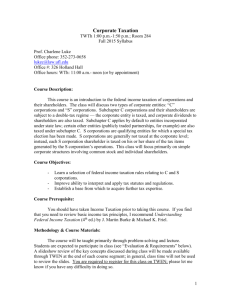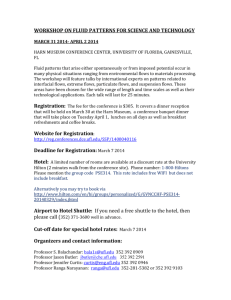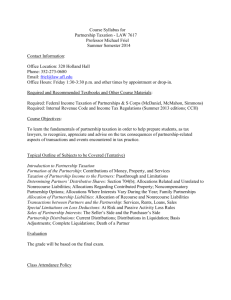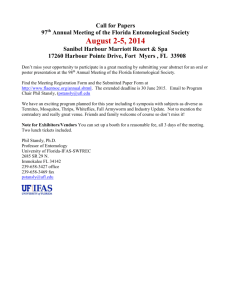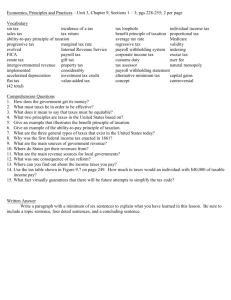Tax Policy Seminar
advertisement
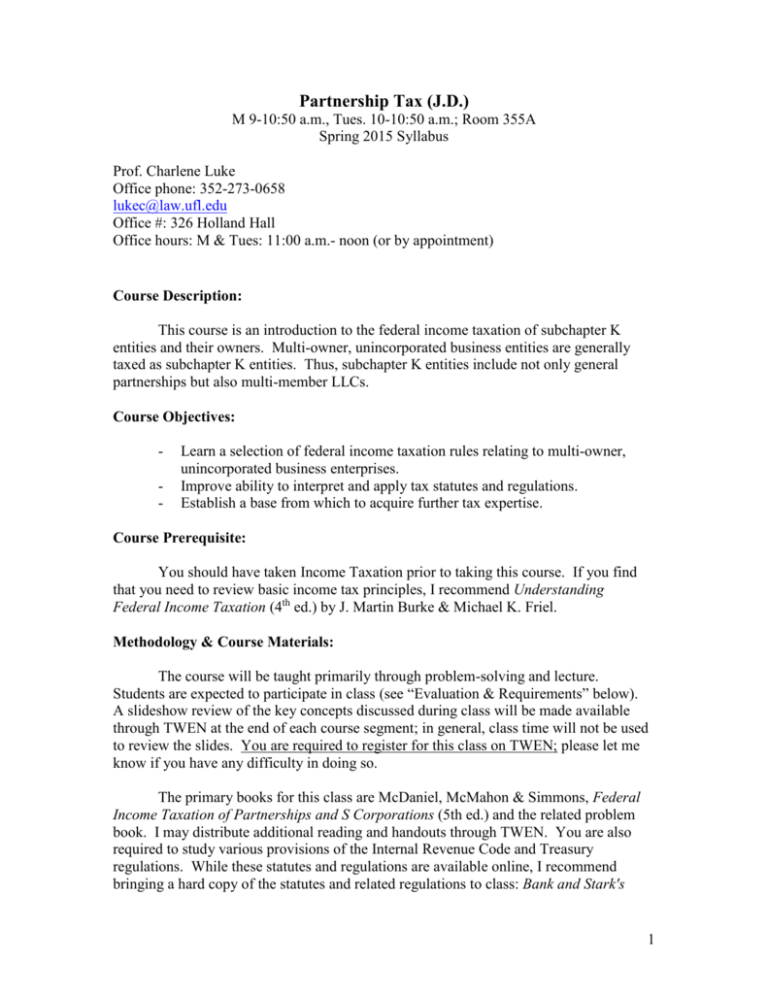
Partnership Tax (J.D.) M 9-10:50 a.m., Tues. 10-10:50 a.m.; Room 355A Spring 2015 Syllabus Prof. Charlene Luke Office phone: 352-273-0658 lukec@law.ufl.edu Office #: 326 Holland Hall Office hours: M & Tues: 11:00 a.m.- noon (or by appointment) Course Description: This course is an introduction to the federal income taxation of subchapter K entities and their owners. Multi-owner, unincorporated business entities are generally taxed as subchapter K entities. Thus, subchapter K entities include not only general partnerships but also multi-member LLCs. Course Objectives: - Learn a selection of federal income taxation rules relating to multi-owner, unincorporated business enterprises. Improve ability to interpret and apply tax statutes and regulations. Establish a base from which to acquire further tax expertise. Course Prerequisite: You should have taken Income Taxation prior to taking this course. If you find that you need to review basic income tax principles, I recommend Understanding Federal Income Taxation (4th ed.) by J. Martin Burke & Michael K. Friel. Methodology & Course Materials: The course will be taught primarily through problem-solving and lecture. Students are expected to participate in class (see “Evaluation & Requirements” below). A slideshow review of the key concepts discussed during class will be made available through TWEN at the end of each course segment; in general, class time will not be used to review the slides. You are required to register for this class on TWEN; please let me know if you have any difficulty in doing so. The primary books for this class are McDaniel, McMahon & Simmons, Federal Income Taxation of Partnerships and S Corporations (5th ed.) and the related problem book. I may distribute additional reading and handouts through TWEN. You are also required to study various provisions of the Internal Revenue Code and Treasury regulations. While these statutes and regulations are available online, I recommend bringing a hard copy of the statutes and related regulations to class: Bank and Stark's 1 Selected Sections: Corporate and Partnership Income Tax Code and Regulations, 20142015. If you wish to consult a supplementary book on partnership tax, I highly recommend The Logic of Subchapter K (4th ed.) by Laura Cunningham and Noël Cunningham. Evaluation & Class Attendance Policy: Grade: 10 percent: Participation 90 percent: Final Exam Class Participation & Attendance: You are expected to attend class and to be prepared to respond to questions; attendance will be taken each day. Repeated lack of preparedness may be counted as one or more absences. Class disruption (e.g., cell phone noise, texting, internet surfing, arriving late, leaving early) may be counted as one or more absences. You will be notified each time you accrue an absence on account of disruptive behavior and/or lack of preparation. Absences taken for observance of religious holidays will be excused. If you are planning to miss class for a religious holiday, please let me know. If you are absent because of a special situation (sickness, family emergency, job interview, etc.), the absence may be excused at my discretion after you have provided adequate documentation of the situation and you have completed a make-up assignment. If you are dealing with a personal situation of high difficulty and prolonged duration, please seek assistance from me and/or the Student Affairs Office as soon as possible. Avenues for obtaining help as to various types of concerns are listed at the website http://www.law.ufl.edu/student-affairs/additional-information/have-a-problem-we-canhelp. If you have more than four unexcused absences from regularly scheduled classes, your participation grade will be 0, and you may be barred from taking the final exam. Final Exam: The final exam will be three hours and will be given during the time scheduled by the law school (currently scheduled for Tues., Apr. 28, 2015, at 1:00 p.m.). The exam will test your knowledge of the assigned reading and the related class discussion. The exam will be completely open book. You may not, however, consult materials via a computer or other electronic device. ExamSoft will be required if you wish to type your answers on computer. You may bring a basic calculator to the exam but it must not 2 be associated with a device with wireless communication capabilities (i.e., calculator may not be a smartphone or tablet app). The law school policy on delay in taking exams can be found at: http://www.law.ufl.edu/student-affairs/current-students/academic-policies#12. Grade Scale & Grading Policies: Grade A (Excellent) AB+ B (Good) BC+ C (Satisfactory) CD+ D (Poor) DE (Failure) Points 4.0 3.67 3.33 3.00 2.67 2.33 2.00 1.67 1.33 1.00 0.67 0.00 The law school grading policy is available at: http://www.law.ufl.edu/studentaffairs/current-students/academic-policies#9. Outline of Topics and Class Assignments: Class assignments are provided at the end of this syllabus. The schedule may be revised to reflect the pace of class discussion and/or any new legal developments. For the first class meeting, read pages 1-40 of the text book and complete the section 2.A problems on pages 1-2 of the problem book. Unless otherwise advised, you should assume that four problems will be covered per class session, and you should prepare accordingly. Other Policies, including Statement on Disability Accommodation: Additional law school and university policies may be found at (1) http://www.law.ufl.edu/student-affairs/current-students/academic-policies (academic policies) and (2) http://www.law.ufl.edu/student-affairs/additional-information/honorcode-and-committee (honor code). Students can provide feedback on the quality of instruction in this course by completing online evaluations at https://evaluations.ufl.edu. Evaluations are typically open during the last two or three weeks of the semester, but students will receive notice of the specific times when they are open. Summary results of these assessments are available to students at https://evaluations.ufl.edu/results/. 3 Students requesting classroom accommodation must first register with the Office of Disability Resources. The UF Office of Disability Resources will provide documentation to the student who must then provide this documentation to the Law School Office of Student Affairs when requesting accommodation. 4 Semester Reading & Problem Assignments I. Introduction to Partnership Taxation Reading: 1-40, 201-204 Problems: All Chapter 1 problems II. Taxation of Partnership Taxable Income to the Partners Reading: 84-110 Problems: All Chapter 3 problems III. Formation of a Partnership: Contributions Reading: 41-51 & 57-78 Problems: (1) Chapter 2, Section 1: All problems except omit problem 2(c)(3) (pg. 5). (2) Chapter 2, Section 3.A: Complete all problems, but add to problem 1(b) (pg. 9): “In determining the tax consequences to Charlie, assume that the building plans have a fair market value of $200,000, and that he has $0 basis in them. Also assume that he contributes the plans to the partnership instead of allowing the partnership mere use.” (3) Chapter 2, Section 3.B: Complete all problems but answer problem 1(a) and problem 2 using the approach using only the proposed regulations. IV. Recourse Liabilities Reading: 205-217 & 51-56 (except only skim the material on nonrecourse debt on page 55) Problems: (1) Chapter 5, Section 1: Complete all problems. For all three problems, assume that the partners have unconditionally agreed to restore a deficit capital account balance at liquidation. (2) Chapter 2, section 2: Complete problem 1(a) and problem 2. For problem 1(a), assume that partnership formation is in Year 1 and the sale of Greenacre followed by partnership liquidation is in Year 2. V. Partners’ Distributive Shares: Substantial Economic Effect Reading: 111-60 5 Problems: Chapter 4, Section 2.A: Complete all problems. For problem (1)(d) (pgs. 14) assume that the partnership sells both the building and land and liquidates. For problem 3 (pg. 14), assume for (f)(2) variation that Brett contributes the promissory note at the formation of the partnership rather than at the end of the 16th year. VI. Partners’ Distributive Shares: Allocations as to Contributed Property Reading: 172-190 Problems: Chapter 4, Section 3: Complete all problems. For Problem 3 (pg. 20), assume that Todd and Ursula initially contributed $300,000 of cash each, which was used to purchase Greenacre. Assume for simplicity that Greenacre, including any associated buildings, is entirely non-depreciable. VII. Partner’s Distributive Shares: Allocations Where Interests Vary Reading: 193-201 Problems: Chapter 4, Section 5: Complete all problems VIII. Transactions between Partners and the Partnership Reading: 230-266 Problems: Chapter 6: Complete all problems IX. Sale of Partnership Interests by Partners Reading: 297-338 Problems: (1) Chapter 8, Section 1: Complete all problems except omit problem 5 (pgs. 34-35) (2) Chapter 8, Section 2: Complete all problems X. Current Distributions in Absence of Unrealized Receivables or Substantially Appreciated Inventory Reading: 339-359 Problems: Chapter 9, Section 1: Complete all problems except omit problem 5 (pgs. 43-44). In completing these problems, assume that a partnership eligible to revalue under Treas. Reg. § 1.704-1(b)(2)(iv)(f) always revalues. XI. Liquidating Distributions & Complete Liquidations 6 Reading: 374-54, 414-427 (but skim the two paragraphs discussing section 751(b) @422) Problems: (1) Chapter 9, Section 3: Complete all problems (2) Chapter 9, Section 6: Complete all problems. For problem 2 (pgs. 46-47) change the partnership’s business from real estate development to rental real estate and change “Lots held for sale” in the partnership books to “Whiteacre,” which is a § 1231 asset not subject to § 1245 recapture; finally, omit the final paragraph of problem 2 (regarding the bulldozer). Additional Topics (if time permits) I. Nonrecourse Debt II. Current Distributions for Partnership Holding Unrealized Receivables or Substantially Appreciated Inventory III. Basis Adjustment to Remaining Partnership Assets after Distribution IV. Mixing Bowl Transactions 7
